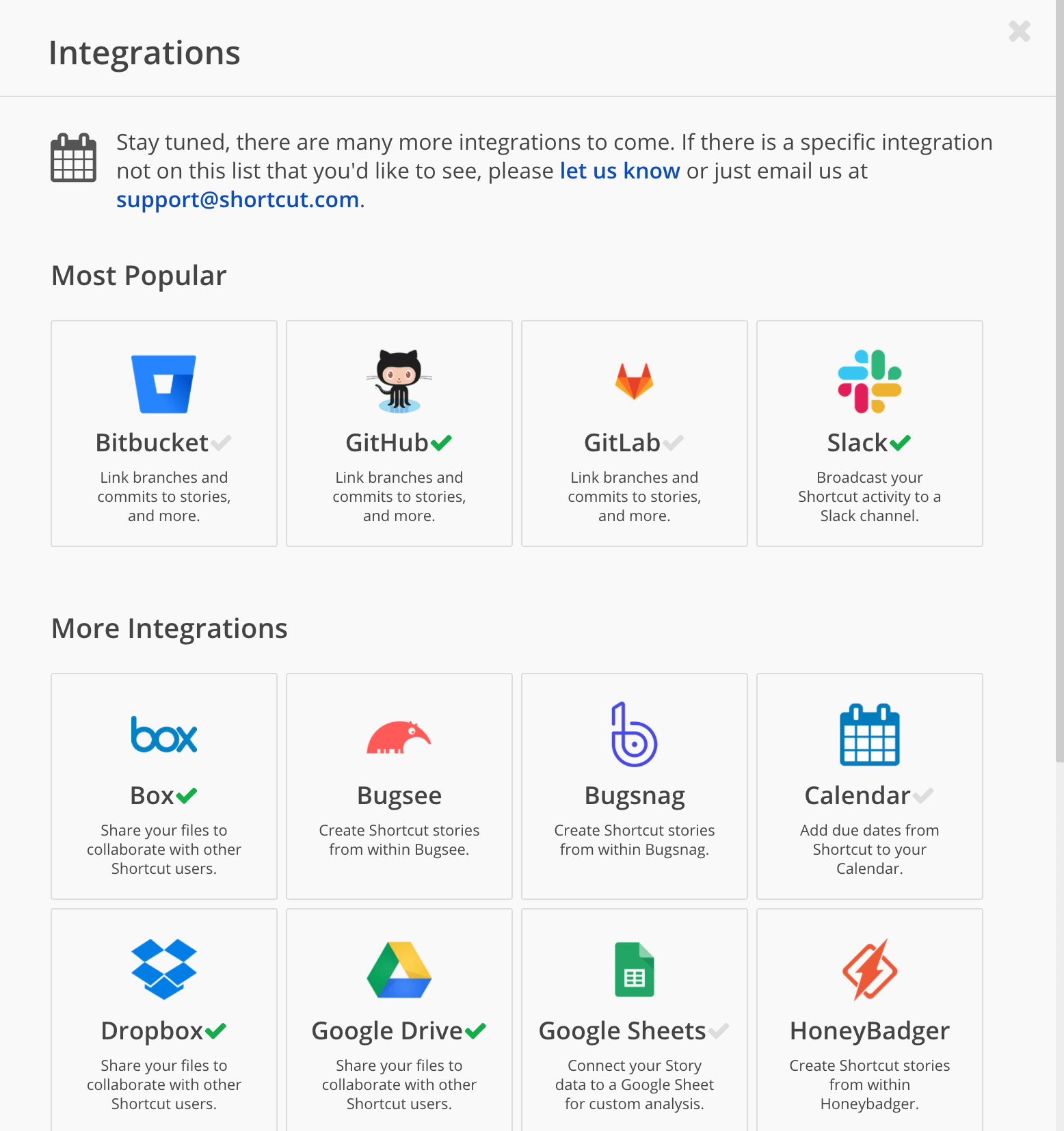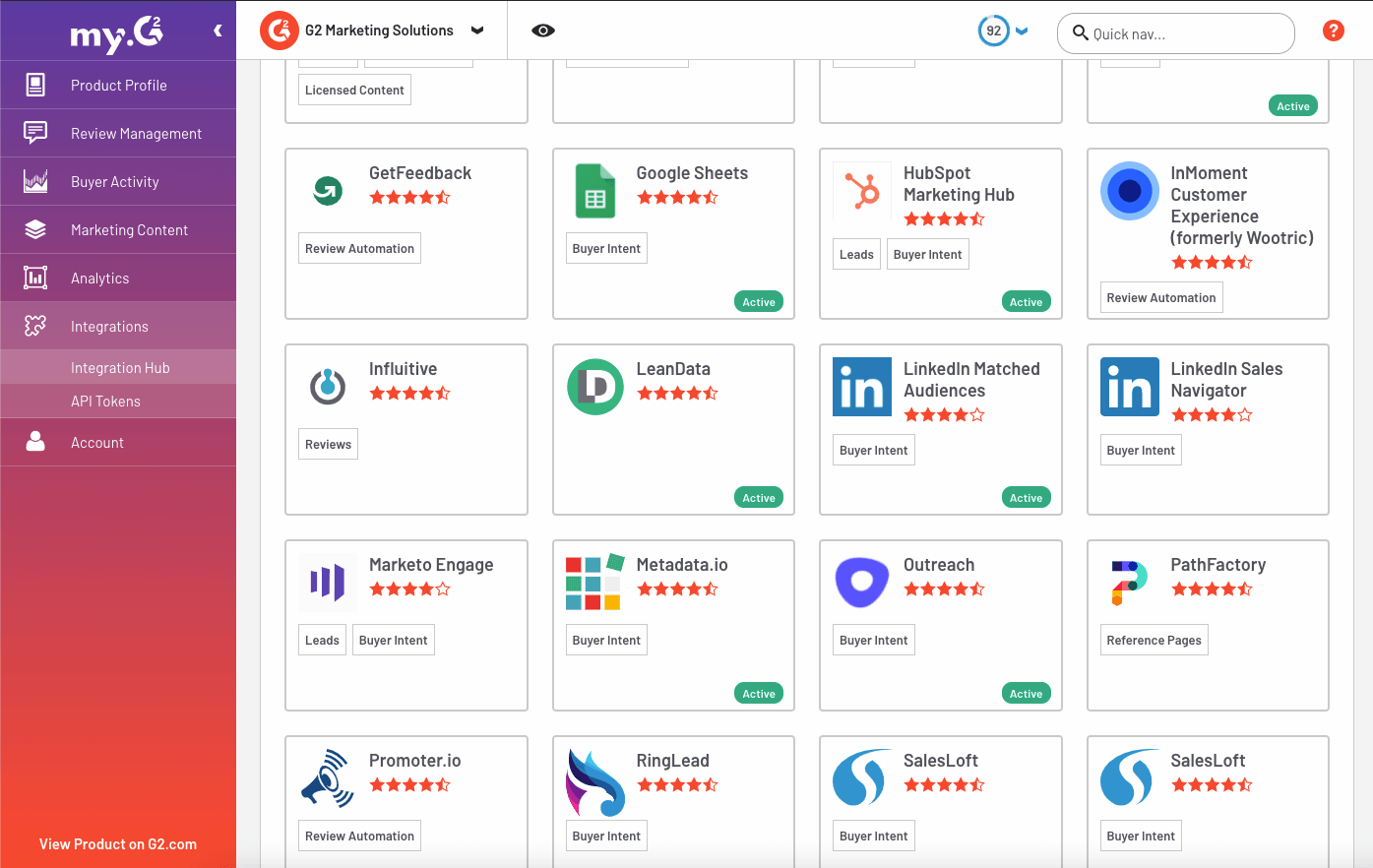In this post, we'll look at who is using integration marketplaces and then focus on the particular advantages of an embedded integration marketplace.
Integration marketplaces are a best practice for B2B SaaS
An increasing number of B2B SaaS companies are implementing integration marketplaces. Shortcut, a SaaS leader in the software project management space, provides a marketplace displaying integrations to source code repositories, bug reporting tools, and collaboration apps:

G2, the world's largest tech review site, provides an integration hub with dozens of integrations enabling companies to connect their G2 seller accounts to CRMs, review automation tools, and more:

Why do many SaaS companies lack an integration marketplace?
Given the sheer scope of the need for integrations in the SaaS space and the value which can be provided by an integration marketplace in addressing this need, why don't more companies have an integration marketplace?
The answer is simple: building an integration marketplace in-house is incredibly time-consuming and expensive. Standing up everything necessary for an integration marketplace to work effectively takes a considerable investment, both for initial development as well as ongoing support. With innumerable core product features competing for scarce engineering resources, it's difficult for most SaaS companies to carve out the significant time and resources it would take to do it right.
An embedded integration marketplace is the solution
For companies that don't currently have an optimal solution for building and managing integrations, an embedded integration marketplace is ideal. Using an embedded integration marketplace allows developers to continue to focus on the core product, while leveraging the marketplace for its customers. Since the embedded integration marketplace is provided by a third party, there is no need for the company to invest in the development, tools, infrastructure and more that make the marketplace work.
What is an embedded integration marketplace?
An embedded integration marketplace is an integration marketplace procured from a third party that allows a SaaS vendor to provide its customers with the integration marketplace functionality without needing to invest in the development and infrastructure of the marketplace. It provides complete marketplace functionality in a seamless way that looks and feels to users like a native part of the application.
Complete out-of-the-box integration UX
Customers are able to easily locate the integrations which are available (including documentation about those integrations), configure the integrations to their specific needs, and activate the integrations. Once the integrations are up and running, the customer may use built-in tools to monitor the integrations, troubleshoot issues that arise, and re-configure integrations as necessary. In short, the customer has direct control over each integration and access to important status information.
Looks and feels like your product
The embedded integration marketplace uses SSO and is white-labeled and themeable to ensure that you are able to customize colors and design elements to match your app, giving your customers a native integration deployment experience. If you want more complete control, you can also design your own UX for the integration marketplace using a fully-exposed API.
At a fraction of the cost of in-house development
A company can deploy an embedded integration marketplace at a fraction of the cost that it would have taken to build it in-house, and it can often do so in a matter of days using just a few lines of code.

Because the vendor is providing the embedded integration marketplace value to many companies, the per company cost is much less than it would be if a single company were to set up its own integration marketplace.
Part of an embedded iPaaS
The embedded integration marketplace is usually provided as part of an embedded iPaaS. Embedded iPaaS solutions are end-to-end platforms that provide everything a software company needs to build productized native integrations, deploy them to customers or enable self-activation, run them in production, and provide high-quality integration support.
Besides the embedded integration marketplace, an embedded iPaaS includes:
- A low-code integration designer that empowers your non-devs to build productized integrations to be configured and deployed to multiple customers.
- A code-native integration building experience that enables your devs to use their favorite IDEs to code productized integrations to be configured and deployed to multiple customers.
- A library of built-in components of reduces your team’s work by providing connectivity to common SaaS apps and standard logic functions without writing any code.
- An embedded workflow designer that enables your customers to build custom integrations between your B2B SaaS product and the customers' other apps.
- Configuration and deployment tools that enable your onboarding team to configure and deploy customers’ integrations without engineering involvement.
- Monitoring and management tools that enable your support team to monitor, and troubleshoot customers' integrations without engineering involvement.
- Customer self-serve support tools that empower your customers to configure, activate, monitor, and troubleshoot their integrations without support or engineering involvement.
Finally, all of this is built on top of a cloud-native infrastructure that runs the integrations and handles scaling, security, and compliance.
This post is an excerpt from our guide, Using an Integration Marketplace for Your B2B SaaS.




